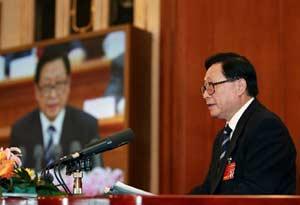Source: CCTV.com
03-11-2008 18:33
Special Report: 2008 NPC & CPPCC sessionsChinese law makers are deliberating a comprehensive administrative reform plan to streamline the State Council. If it's passed by the National People's Congress, the plan will create super ministries to boost government efficiency and reduce bureaucratic overlap.
 |
| State Councilor Hua Jianmin, who is also Secretary General of the State Council, delivers the explanation of the plan for institutional restructuring of the State Council during the fourth plenary meeting of the First Session of the 11th National People's Congress (NPC) at the Great Hall of the People in Beijing, capital of China, March 11, 2008. (Xinhua Photo) |
China is back in the spotlight. The plan of State Council reform is raised at the National People's Congress for deliberation. It is seen as a major content of China's political reform.
Hua Jianmin, State Councilor of Secretary General State Council said "Though China's economic system is basically established, it's not suited to the new era of social and economic development. It cannot meet the requirements for safeguarding social fairness, and people's democratic rights."
Hua Jianmin says the overall purpose of governmental reorganization is to shift the functions and capabilities towards greater compatibility with a market economy.
The Key moves would be:
Divide responsibilities among departments that exercise macro-economic regulation.
Consolidate all the fuel-related responsibilities of different energy agencies.
Merge the industries and information that would help China on the road of innovative industrialization.
Combine transport and communications so as to form a more efficient transportation system.
Improve responsibility for public services and human resources.
Increase the power of environmental protection to tackle the pressing environmental issues.
Hua Jianmin said "The final goal of the reform is to set up a relatively perfect administrative system with Chinese characteristics by 2020. The changes are designed to make the Chinese government significantly stronger as a regulatory body and to reduce direct government management of businesses."
The thinking of the "mega ministry" was initiated at the 17th party congress last October. The CPC secretary general Hu Jintao called on reforms to streamline the government. While a meeting of the Party's central Committee a week ago approved the guiding principle of this reform. Premier Wen Jiabao in his work report Wednesday released that the shifts will center on changing the way the government functions, and improving departments responsible for public administration and services.
The economic reforms began three decades ago. Since then, China has initiated five reforms to streamline government departments. In 1998, it cut the number of departments to 29. Yet this number is still much higher than major industrialized nations like the United States or Britain. The process will be long, and full of challenges, but the aim is to get China into the same ranks as other developed nations.
Editor:Xiong Qu
